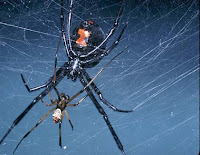...but names, they will always define me. What a delightful idea: in Joan Slonczewski's A Door Into Ocean, the Sharers of Shora are named for their greatest weakness. Nisi the Deceiver. Lystra the Intemperate. Merwen the Impatient. Anthony the...
No, I'm not worthy of self-naming yet. If the egalitarian Sharers have a single division in their society it is this: being mature enough to name yourself publicly. I would need a leave of absence, an ocean to stare deeply into, the time to listen for an answer, to confront the other within me whom I constantly seek to deny. It is this other that we must make a part of our everyday. Vomit them up, in all their ugliness, behold that which corrupts us from within, swear in front of friend and neighbor that we will spend our days defeating these Other Us's by becoming them. Only then, drawn to the surface, may these Other Us's be un-othered, occupy a place in which we can finally deal with them.
In "Building Dwelling Thinking," Martin Heidegger opens with the premise that underlies much of his work: "It is language that tells us about the nature of a thing, provided we respect language's own nature."
If we approach language, if we are receptive to logos, and let it speak us as much as we speak it, then it will reveal the nature of things. For the Sharers, the thing they are is that which they name themselves, but the name will not come until they learn to inhabit the language that dwells within the world. In Shora birth names are literally in the world, whispered by the waves (Mer-wen, U-sha, goes the tide). The more difficult language to hear is that within the being. Profound silence is needed to hear the utterance of truth's concealment (Deceiver), of temperance's lack (The Intemperate), of forgiveness' disappearance (Unforgiver).
Maybe I could ask my wife: Who is the Other Me which I must become to overcome?
This is often what lovers can do best for each other, but can never do. I was once at a party in Chicago in a neighborhood I usually did not frequent, among people I did not know, among a kind of wealth that I seldom deal in. A divorce lawyer, a very successful one, fell into conversation with me. He was fascinating to listen to, full of the most operatic tales of love found, lost, bought, cheated, sullied, and destroyed.
Heidegger again: "...to be sure, there rages round the earth an unbridled yet clever talking, writing, and broadcasting of spoken words. Man acts as though he were the shaper and master of language, while in fact language remains the master of man."
"It's all taught me one thing," said the divorce lawyer, after we had talked through two or three drinks. "It's the secret to staying together—I see it time, after time, after time. You get 3 big trusts. Everybody breaks little trusts all the time, but these are big. Things you know about her and she knows about you that you can never say. Not even to each other. Not even aloud. You let one go, you break something that can never be put back together. Most people can't even work through one of those. Some people get through two. No body survives three."
His example, which was simple but perfect, was a spouse who tells her husband after a fight that she doesn't like his nose. That's it: "You've got a big nose." Something breaks. It never comes back.
As interesting the lawyer's stories were, he was bitter. He had seen too much not work, too much unfulfilled between people. Still, the conclusion stuck with me. It seemed like the sediment of all those hundreds of divorce cases. Its truth, undeniable.
"Perhaps it is before all else man's subversion of this relation of dominance that drives his nature into alienation."
Reading A Door reminded me of the lawyer's 3 trusts. Here too naming takes on a permanence with powerful effects. The Sharers are compelled to say that which we cannot hear from our lovers. They must break the sacred trust with themselves. Yes, in a sense, admit to themselves, "I have a big nose." Admit it to the world, and in so doing become empowered by it.
These are not creatures further deluded than we. This is no mastering of language. Rather, naming forges a covenant with language, allowing it to speak them. It is not a resistance to language; it is a resistance to all those who would use it to subject them. They can never be alienated from themselves. This naming becomes a source of their strength. They name the chink in their armor, making it impossible for their enemies to expose it. That is the power they have uncovered, the secret of their resistence: their own exposure, naked, named, truthful, free. White-trance is its exaggerated state—barren, white, unstrikable. To seek to master that which has been so utterly exposed can only mean confrontation with one's own lack of exposure. One's own alienation rises up. And is this not just another face of one's own death? The door which has never been given a name?

